… when the fruit is ripe
We should eat fruit at the right moment: at its full ripeness, neither when it is still too unripe nor when it is already too ripe. You can determine that it is perfectly ripe when its perfume smells at its maximum. You can smell this wonderful odor easily when the fruit is at room temperature. 
When it is unripe, it has a greater content in complex carbohydrates. As it ripens, these carbohydrates are converted into sugars, which are digested much more easily.
When perfectly ripe, the number of lactobacilli in a fruit is at its maximum and so there is greater digestibility.
When the fruit is too ripe, certain species of fungi start decomposing it, and there may be visible fungal spots under the peel. The smell begins to be slightly alcoholic, due to the fermentation effect of fungi.
... bad fruit combinations
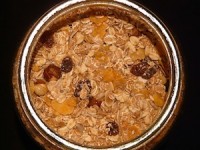 Fruit is the food that we digest most quickly, in about 30 minutes. This is due to the fact that it contains a high percentage of water and because fructose does not require digestion but it is absorbed directly and we only need to digest the fiber.
Fruit is the food that we digest most quickly, in about 30 minutes. This is due to the fact that it contains a high percentage of water and because fructose does not require digestion but it is absorbed directly and we only need to digest the fiber. According to Herbert Shelton, creator of the food combining diet or dissociated diet, we should not eat fruit, carbohydrates and proteins together at the same meal. These three products should be eaten separately. The explanation given is that the acid that most fruits contain prevents the action of amylases, the enzymes that digest starches or carbohydrates. Moreover, fruit sugar inhibits the gastric acid secretion, this way hindering the digestion of proteins, too. So fruits must be eaten separately from other foods: carbohydrates, proteins, fats, etc. Otherwise, the digestion of fruit is slowed down because it must "wait" for the digestion of other foods in the stomach, during which time we may start experimenting fermentations.
So muesli, bread with raisins and duck with orange sauce are not very good ideas for meals.
An acceptable combination with fruit could be honey and nuts (almonds, walnuts, hazelnuts, pine nuts, etc).
… the particularly problematic ones
Some types of fruit may cause many problems to certain people, especially if their intestinal flora is unbalanced.
1.- Nuts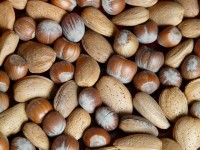 Almonds, hazelnuts, cashews, pine nuts, walnuts etc., contain numerous anti-nutrients, substances that prevent the proper digestion of food and absorption of nutrients. Therefore, it is recommended to previously prepare them in a traditional way.
Almonds, hazelnuts, cashews, pine nuts, walnuts etc., contain numerous anti-nutrients, substances that prevent the proper digestion of food and absorption of nutrients. Therefore, it is recommended to previously prepare them in a traditional way. In addition, people with food allergies or intolerances are often prone to experience these allergies or intolerances to nuts as well.
2. Banana
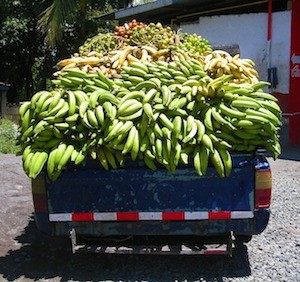 Banana and plantain come from tropical countries, they are collected when still unripe, and in order not to be damaged during their journey, they are often treated with chemicals to be preserved. When they arrive at the destiny, they are gassed with ethylen in order to trigger their ripening.
Banana and plantain come from tropical countries, they are collected when still unripe, and in order not to be damaged during their journey, they are often treated with chemicals to be preserved. When they arrive at the destiny, they are gassed with ethylen in order to trigger their ripening.Furthermore, according to Mosseri, who created the Natural Hygiene diet, bananas naturally contain a toxic substance in their peel which is used as a drug. This substance also remains on the surface of banana in small amounts, so that the most sensitive people who can not neutralize this substance may experience problems eating bananas.
3.- Apricot and plum
Just like bananas, these fruits also contain toxic substances and some people can suffer some intestinal problems with this fruit. That is why plums are used as laxatives.
4.- Citrus
 Most fruit contains some acidity, but citrus are extremely acidic. The body needs to offset this acidity in the intestine during the digestion with its existing alkaline substances. Once neutralized, fruits always produce a lot of blood level alkalizing minerals that compensate for the loss during the digestion. But if the digestion of these fruits is not properly performed, which may happen for different reasons, then the overall balance is acidification, and therefore, a loss of minerals in the body. This is what usually happens to people who abuse of fruit.
Most fruit contains some acidity, but citrus are extremely acidic. The body needs to offset this acidity in the intestine during the digestion with its existing alkaline substances. Once neutralized, fruits always produce a lot of blood level alkalizing minerals that compensate for the loss during the digestion. But if the digestion of these fruits is not properly performed, which may happen for different reasons, then the overall balance is acidification, and therefore, a loss of minerals in the body. This is what usually happens to people who abuse of fruit.5.- Tropical fruit
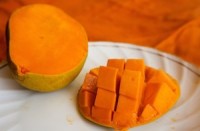 Tropical fruit such as mango, pineapple, papaya, etc., similarly to bananas, are treated with chemicals to withstand the long journey from the producer country.
Tropical fruit such as mango, pineapple, papaya, etc., similarly to bananas, are treated with chemicals to withstand the long journey from the producer country. Moreover, most of them are very acidic, so we run the same risk of acidification as with citrus.
There is another problem for people who do not come from tropical countries: they are not adapted to this type of food, that is, their enzyme system usually does not contain enzymes to digest these fruits.
6.- Tomato
Tomato is considered a fruit, also a very acidic one. It is one of the few fruits, along with avocado and lemon, which may be combined with salads without any problem.
 7.- Dried fruit
7.- Dried fruitDried fruit, such as dates, apricots, figs, plums and raisins contain a much larger amount of sugar than fresh fruit. Some people with intestinal dysbiosis, candida or yeast overgrowth should avoid eating dried fruit. In any case, when dried fruit is not well tolerated, you may get flatulence and abdominal distention.
Select only fruit which has been sun-dried, and which does not contain sulfur dioxide or other additives. Fruit which has been dried by artificial dehydration (heat evaporation) is usually dipped into a sulfur dioxide bath to keep it from darkening. Golden raisins,and any dried fruit that is light in color, have been treated with sulfurdioxide. Almost all dried fruit is fumigated during storage or shipping. Preservatives are not necessary in these products, but some processors add sorbic acid as a preservative, and some add corn syrup or honey to keep them from drying out.
Whole fruit, fruit juice, smoothies, cooked fruit…?
 There are different effects to eating whole fruit and drinking juices or smoothies. Juice contains vitamins, minerals and sugars in a more concentrated way than whole fruit, so you can consume more of these nutrients. As they do not contain fiber, people who can not tolerate fiber can benefit from fruits this way. Juice may be considered medicine, which may have therapeutic effects and be beneficial for some time, but fiber is necessary, so I usually advise that it is best to eat the whole fruit.
There are different effects to eating whole fruit and drinking juices or smoothies. Juice contains vitamins, minerals and sugars in a more concentrated way than whole fruit, so you can consume more of these nutrients. As they do not contain fiber, people who can not tolerate fiber can benefit from fruits this way. Juice may be considered medicine, which may have therapeutic effects and be beneficial for some time, but fiber is necessary, so I usually advise that it is best to eat the whole fruit.Smoothies contain the same nutrients as whole fruit, but crushed, so by drinking smoothies we skip the first phase of digestion, which is chewing and salivation. Saliva contains precious enzymes which begin the first phase of digestion. And although these enzymes are mainly amylase and lipase which digest carbohydrates and lipids, some fruits also contain a certain amount of these nutrients.
With regard to cooking fruits, they become more digestible and certain substances of the fruit that may be offensive to some people and may create allergies or intolerances, are inhibited. However, at the same time important vitamins and enzymes are destroyed. So overall, if well tolerated, it is best to eat the whole raw fruit, as nature gives it to us. Juices and smoothies can be taken from time to time, or because of a therapeutic goal.
… with or without peel?
The peel of fruits contains many nutrients, especially vitamins, but also toxic substances to insects and other predators. This is because the peel must protect the fruit inside it from the aggression of these predators and from the inclemency of the weather. So, eating the peel may cause a big problem to sensitive people.
This is because the peel must protect the fruit inside it from the aggression of these predators and from the inclemency of the weather. So, eating the peel may cause a big problem to sensitive people. Also, pesticides spayed on fruit are concentrated on skin.
Moreover, the peel is not digested but is expelled in the feces. So the valuable nutrients it contains are not taken advantage of.
Once fruit has been peeled, it must be eaten quickly, because vitamins are lost and fruit is oxidised.
… local and seasonal
Fruits that have to be transported long distances are picked unripe and often treated with chemicals in order to preserve them. It is best to consume locally produced fruits.
Although nowadays most fruits are available throughout the year, this is not what nature offers to us. Nature offers fruit that is best suited to the needs of each season: citrus that is rich in vitamin C in winter, watery fruit to increase fluid intake in summer, berries in spring to help detoxification after the winter, etc.
Eating the same type of fruit all year round can create intolerances in addition to being anti-natural.
… intolerances and allergies
When there is an intolerance to all types of fruit it is usually because there is a fructose intolerance.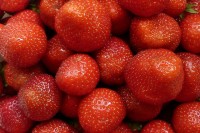 As explained in this previous article, fructose is absorbed directly in the small intestine and it does not require any digestion. So, if there is a fructose intolerance, it is due to a bacterial overgrowth in the small intestine. If we address this intestinal dysbiosis through a nutritional treatment, this kind of intolerance usually disappears.
As explained in this previous article, fructose is absorbed directly in the small intestine and it does not require any digestion. So, if there is a fructose intolerance, it is due to a bacterial overgrowth in the small intestine. If we address this intestinal dysbiosis through a nutritional treatment, this kind of intolerance usually disappears. Allergy to certain fruits, such as strawberries and other berries exists because there is an increased intestinal permeability (leaky gut). By treating this bowel condition, allergies tend to disappear.
To sum up:
It is best to eat the whole fruit, when perfectly ripe, without peel, local and seasonal. If you have some disconfort when eating fruit, try to be eaten alone or mixed just with nuts.Fruit is an important food, so if there is any intolerance it’s because there’s a gut dysbiosis, who creates a fructose intolerance. And allergies are due to a leaky gut. Both intestinal disorders can be treated and healed.
Bibliography:
“Food Combining made Easy”, Herbert M. Shelton
“La Nourriture idéale et les combinaisons simplifiées”, Albert Mosséri
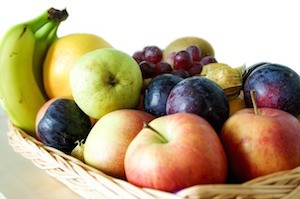 In summer we often feel like eating fruit: it is refreshing, sweet and a healthy choice for snacks and breakfast. Fruits provide valuable vitamins, minerals; they are detoxifying, antioxidant and help to regulate the digestion, etc.
In summer we often feel like eating fruit: it is refreshing, sweet and a healthy choice for snacks and breakfast. Fruits provide valuable vitamins, minerals; they are detoxifying, antioxidant and help to regulate the digestion, etc. 











